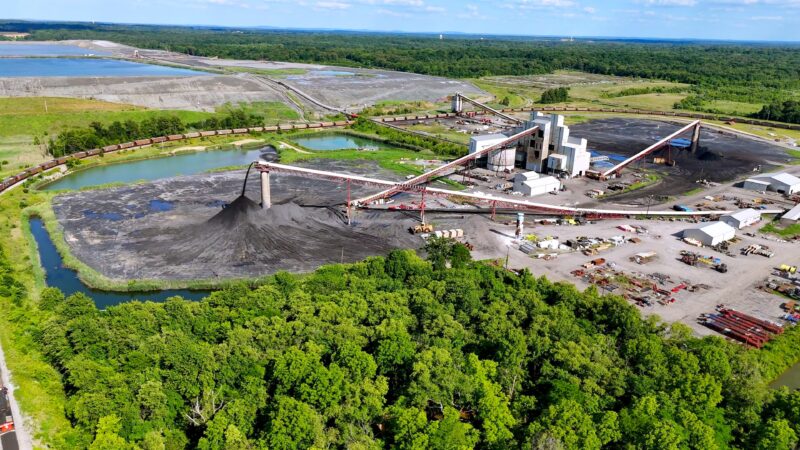
JOHNSTON CITY, Ill. – Illinois’ waters will be better protected from mining waste thanks to a new settlement finalized last week. The settlement was reached after negotiation between nonprofit environmental groups and Williamson Energy LLC, a subsidiary of St. Louis-based Foresight Energy, which owns and operates the Pond Creek coal mine.
The settlement comes after the groups and area residents mounted overwhelming opposition to Illinois EPA’s approval of the mine’s permit to discharge mine waste into the Big Muddy River and Pond Creek, a tributary to the Big Muddy River located upstream of the rivers’ entry into Shawnee National Forest. The settlement will mean much more stringent limits on the mine than originally proposed, and seeks to address concerns for the environmental impacts of the 7.2 million gallons per day of polluted water that the permit allows the mine to discharge each day.
The Illinois Sierra Club and Prairie Rivers Network, represented by Albert Ettinger and Great Rivers Environmental Law Center, won more comprehensive protections from pollution of the Pond Creek coal mine that will result in stronger, enforceable, and transparent limits on pollution from the mine, as well as funding for robust river quality monitoring at the USGS gauge downstream of the mine near Murphysboro.
Under the agreement, the mine will be subject to real-time monitoring and will be forced to stop discharges if it begins to violate its permit. The mine is currently releasing discharges above permit levels to Pond Creek impacting the water quality and harming aquatic life.
“Coal mines in Illinois should not use our creeks and rivers as a dumping ground for toxic waste. We’re proud that they will be held to a higher standard for future dumping,” said Andrew Rehn, director of Climate Policy at Prairie Rivers Network.
Prairie Rivers Network and Sierra Club remain opposed to coal mining, its use of our rivers as waste disposal, and the climate impacts it causes, but are proud of the improvements to the permit we won in the settlement. These include:
- Real time monitoring of chloride levels in the Big Muddy through development of a protective worst-case correlation between chloride and conductivity (chloride cannot be feasibly measured in real time, conductivity can).
- Transparent reporting of real time chloride measurements (to Prairie Rivers and Sierra Club)
- Third party validation of water quality samples
- Restoration of the Murphysboro USGS Big Muddy River gauge to monitor dissolved oxygen, temperature, pH, and conductivity.
- Phosphorus controls
- A chloride minimization study
“Mining for fossil fuels pollutes our water supply, our communities, and our planet, “ said Jack Darin, Director of the Sierra Club Illinois. “This settlement will better protect the Big Muddy River, but it is also an urgent reminder of the need for a just transition to a better future for Southern Illinois that builds stronger communities and leaves a cleaner environment for future generations.”
The permit at issue, National Pollution Discharge Elimination System (NPDES) Permit #IL0077666, was initially proposed in 2019 to allow the mine to discharge water with high amounts of chloride through a pipeline to the Big Muddy River. The public hearing for the permit drew significant opposition to the proposed permit and pipeline, with more than 100 concerned residents attending in Marion.
In April 2022, Pond Creek mine was issued a permit by the Illinois Environmental Protection Agency that authorized the discharge through the pipeline. Before discharging, the mine was required to develop and seek Illinois EPA approval for a chloride measurement plan. In May 2022, Sierra Club and Prairie Rivers Network appealed this NPDES permit to the Illinois Pollution Control Board.
Among the concerns raised in the appeal was the complex yet incompletely described measurement plan for chloride monitoring and the lack of ability for the public to contest the plan. In May 2023, the IPCB agreed that the monitoring scheme could not be approved by Illinois EPA without public input on the details.
In August 2023, Illinois Attorney General Kwame Raoul filed a related lawsuit against Williamson Energy, alleging that the company violated permit limits dozens of times, failed to report bypasses, caused numerous violations of water quality standards, and failed to comply with good mining practices. The environmental groups have intervened in that lawsuit as well. The company is facing fines of up to $50,000 for each of those violations and environmental groups are seeking strong enforcement of our environmental laws and outcomes that benefit the surrounding communities.
The Illinois EPA will include the revisions in the settlement and notice the new permit for public input.
###
Prairie Rivers Network
At Prairie Rivers Network (PRN), we protect water, heal land, and inspire change. Using the creative power of science, law, and collective action, we protect and restore our rivers, return healthy soils and diverse wildlife to our lands, and transform how we care for the earth and for each other. PRN is the Illinois affiliate of the National Wildlife Federation. To learn more please visit www.prairierivers.org.
Sierra Club Illinois
The Sierra Club is America’s largest and most influential grassroots environmental organization, with more than 3.8 million members and supporters. In addition to protecting every person’s right to get outdoors and access the healing power of nature, the Sierra Club works to promote clean energy, safeguard the health of our communities, protect wildlife, and preserve our remaining wild places through grassroots activism, public education, lobbying, and legal action. For more information about the Illinois Chapter of Sierra Club, visit www.sierraclub.org/illinois.
Great Rivers Environmental Law Center
Great Rivers Environmental Law Center is a 501c3 nonprofit organization. Since 2002, the Law Center has worked to protect the environment and public health of Missouri and Southern Illinois. Our impact is realized across the state through cleaner air and water, protected parks and wild lands, increased investments in renewable energy, and seats at the table for citizen voices. To learn more about the Law Center, visit www.greatriverslaw.org.







